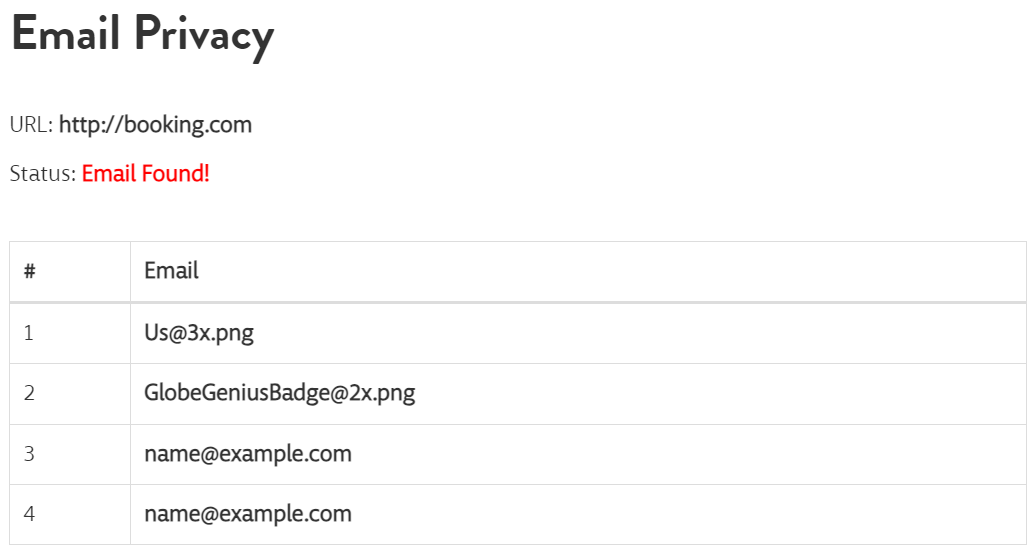Email Privacy
Enter a URL
About Email Privacy
Email privateness
E-mail privacy device tells approximately the safety of e-mail identity connected with a particular area call. Get the information of cozy emails attached with the domain name with the aid of coming into the website details within the container.
An electronic mail privacy checker is a web tool. It's miles able to crawl through all webpages of a website to find out if an electronic mail address is present. If the email copes with this, then it is eliminated with the help of the developer. If you need to maximize an internet site's safety, there isn't any need to download this device. While you search this device on a seek engine, many effects will appear. Several websites are providing this device without spending a dime of the price. A character can run it online by adding the area name. They can discover the effects in only a few seconds for comfort.
How does the email privacy checker device work?
The method for making use of the email privacy checker device is simple. Beneath are a few steps to observe to your ease.
Open the e-mail privacy checker tool on the home web page.
Now, open the homepage of a website that you need to experiment with.
Replica the URL of that precise website online and paste it into the e-mail privacy checker tool's seek bar.
Enter the captcha code after adding the URL and click on the post button.
The result consists of all e-mail addresses mentioned on the internet site. In case you would love to hide any of them, scramble them with a web developer's guide.
A way to defend your privateness and prevent getting scammed
E-mail messages are included under the Electronic Communications privateness Act (ECPA), which establishes how an e-mail message needs to be handled as some distance as privacy goes. However, it’s essential to recognize what this indicates and the way to defend your privacy so you don’t get scammed or lose manage of your facts. Right here are some recommendations on how to do just that.
Electronic mail privateness basics
Nowadays, it looks like all and sundry has an email address. It’s an easy manner to live in contact with humans, but it could be easy for others to apply those same debts maliciously. Even as there are infinite approaches your account ought to get hacked—from keyloggers that tune what you kind on your keyboard, not unusual phishing schemes, or maybe a physical protection breach at your company’s place—one of the most popular ways humans use email is as a part of a scam or phishing scheme. In truth, in line with Verizon's 2017 information breach investigations report (dir), more than 60% of breaches in 2016 leveraged spear-phishing techniques in which attackers ship professional-looking emails trying to scouse borrow information from victims through the usage of their credentials.
What if I get hacked?
It’s one of the scariest things that could occur: getting hacked. Whether or not it’s your e-mail account or your commercial enterprise account, a hacker gaining access is a nightmare situation. They might delete emails, snoop through private documents, or impersonate you to ship fake messages. Right here are some hints on how to protect yourself from hackers in addition to saving you scams whilst the use of your domain e-mail.
Ought I alternate my electronic mail password regularly?
Trade your password frequently. If you frequently trade your password, it's going to make it harder for scammers. But if you do it too often, you will possibly forget your new password, making things worse! Make certain you pick a good password so that doesn’t show up. Tip: a sturdy password must comprise numbers and letters without more than repeated characters in a row. Don’t use phrases observed in any dictionary—each person should bet the one's passwords! And don’t use your puppy’s call or birthdate, both; hackers would possibly take a look at those statistics without problems online to wager at passwords. Lastly, don’t consist of any of your private information or actual e-mail addresses.
Don't reuse passwords for a couple of bills
Reusing passwords isn’t only a breach of internet safety. It can also result in unauthorized fees on your credit card, as well as divulging your non-public facts. To defend your privacy, use an exceptional password for each of your bills. A comfy password is straightforward: long, complicated, and particular for each account. If you follow these rules, there might be no way everyone can bet what it's miles!




